Zhaoji Fu
Artificial Intelligence System for Detection and Screening of Cardiac Abnormalities using Electrocardiogram Images
Feb 10, 2023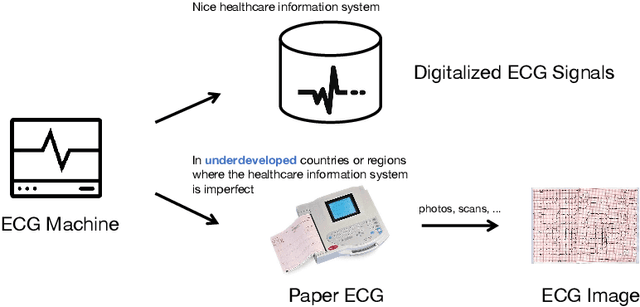



Abstract:The artificial intelligence (AI) system has achieved expert-level performance in electrocardiogram (ECG) signal analysis. However, in underdeveloped countries or regions where the healthcare information system is imperfect, only paper ECGs can be provided. Analysis of real-world ECG images (photos or scans of paper ECGs) remains challenging due to complex environments or interference. In this study, we present an AI system developed to detect and screen cardiac abnormalities (CAs) from real-world ECG images. The system was evaluated on a large dataset of 52,357 patients from multiple regions and populations across the world. On the detection task, the AI system obtained area under the receiver operating curve (AUC) of 0.996 (hold-out test), 0.994 (external test 1), 0.984 (external test 2), and 0.979 (external test 3), respectively. Meanwhile, the detection results of AI system showed a strong correlation with the diagnosis of cardiologists (cardiologist 1 (R=0.794, p<1e-3), cardiologist 2 (R=0.812, p<1e-3)). On the screening task, the AI system achieved AUCs of 0.894 (hold-out test) and 0.850 (external test). The screening performance of the AI system was better than that of the cardiologists (AI system (0.846) vs. cardiologist 1 (0.520) vs. cardiologist 2 (0.480)). Our study demonstrates the feasibility of an accurate, objective, easy-to-use, fast, and low-cost AI system for CA detection and screening. The system has the potential to be used by healthcare professionals, caregivers, and general users to assess CAs based on real-world ECG images.
Defending Against Adversarial Attack in ECG Classification with Adversarial Distillation Training
Mar 14, 2022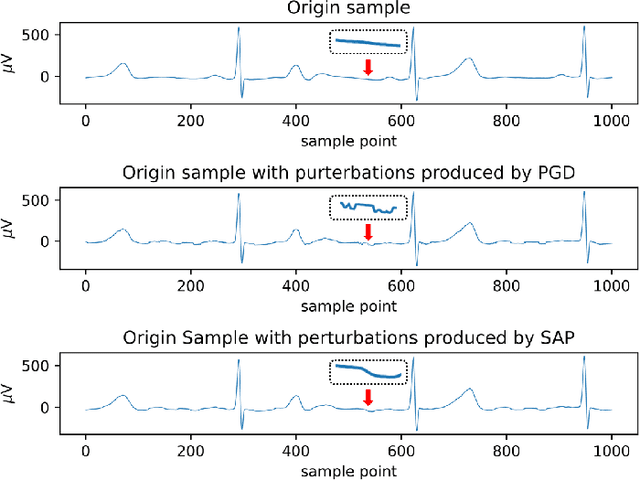

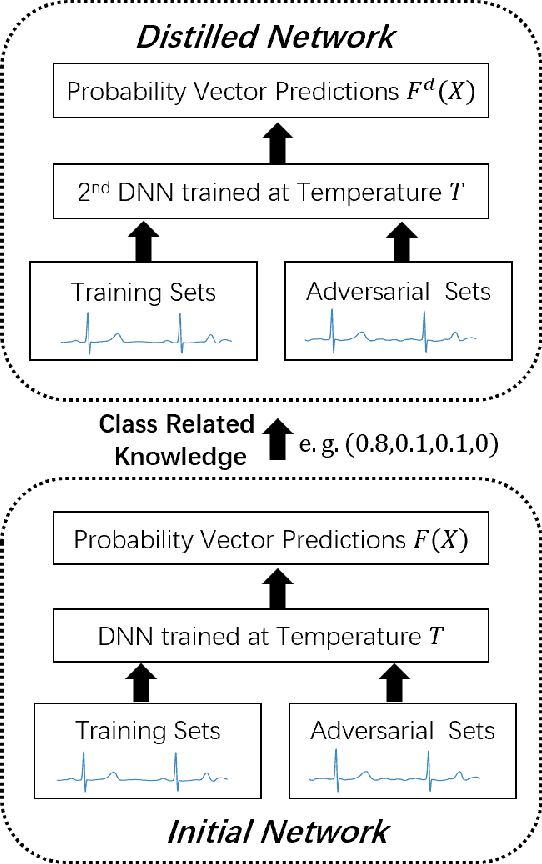

Abstract:In clinics, doctors rely on electrocardiograms (ECGs) to assess severe cardiac disorders. Owing to the development of technology and the increase in health awareness, ECG signals are currently obtained by using medical and commercial devices. Deep neural networks (DNNs) can be used to analyze these signals because of their high accuracy rate. However, researchers have found that adversarial attacks can significantly reduce the accuracy of DNNs. Studies have been conducted to defend ECG-based DNNs against traditional adversarial attacks, such as projected gradient descent (PGD), and smooth adversarial perturbation (SAP) which targets ECG classification; however, to the best of our knowledge, no study has completely explored the defense against adversarial attacks targeting ECG classification. Thus, we did different experiments to explore the effects of defense methods against white-box adversarial attack and black-box adversarial attack targeting ECG classification, and we found that some common defense methods performed well against these attacks. Besides, we proposed a new defense method called Adversarial Distillation Training (ADT) which comes from defensive distillation and can effectively improve the generalization performance of DNNs. The results show that our method performed more effectively against adversarial attacks targeting on ECG classification than the other baseline methods, namely, adversarial training, defensive distillation, Jacob regularization, and noise-to-signal ratio regularization. Furthermore, we found that our method performed better against PGD attacks with low noise levels, which means that our method has stronger robustness.
MetaVA: Curriculum Meta-learning and Pre-fine-tuning of Deep Neural Networks for Detecting Ventricular Arrhythmias based on ECGs
Mar 01, 2022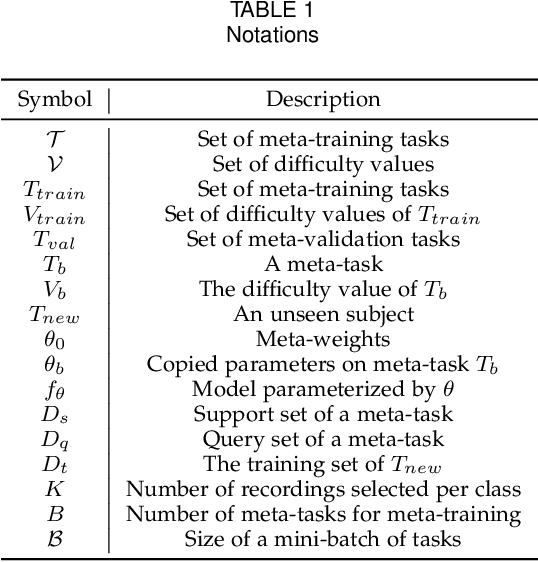
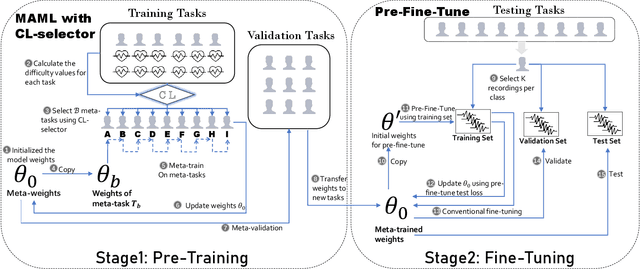


Abstract:Ventricular arrhythmias (VA) are the main causes of sudden cardiac death. Developing machine learning methods for detecting VA based on electrocardiograms (ECGs) can help save people's lives. However, developing such machine learning models for ECGs is challenging because of the following: 1) group-level diversity from different subjects and 2) individual-level diversity from different moments of a single subject. In this study, we aim to solve these problems in the pre-training and fine-tuning stages. For the pre-training stage, we propose a novel model agnostic meta-learning (MAML) with curriculum learning (CL) method to solve group-level diversity. MAML is expected to better transfer the knowledge from a large dataset and use only a few recordings to quickly adapt the model to a new person. CL is supposed to further improve MAML by meta-learning from easy to difficult tasks. For the fine-tuning stage, we propose improved pre-fine-tuning to solve individual-level diversity. We conduct experiments using a combination of three publicly available ECG datasets. The results show that our method outperforms the compared methods in terms of all evaluation metrics. Ablation studies show that MAML and CL could help perform more evenly, and pre-fine-tuning could better fit the model to training data.
A Deep Bayesian Neural Network for Cardiac Arrhythmia Classification with Rejection from ECG Recordings
Feb 26, 2022

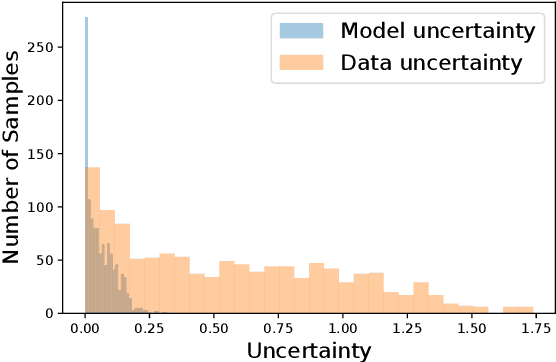
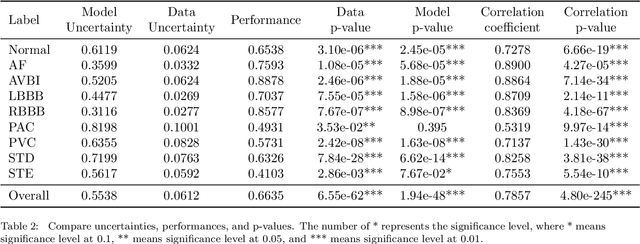
Abstract:With the development of deep learning-based methods, automated classification of electrocardiograms (ECGs) has recently gained much attention. Although the effectiveness of deep neural networks has been encouraging, the lack of information given by the outputs restricts clinicians' reexamination. If the uncertainty estimation comes along with the classification results, cardiologists can pay more attention to "uncertain" cases. Our study aims to classify ECGs with rejection based on data uncertainty and model uncertainty. We perform experiments on a real-world 12-lead ECG dataset. First, we estimate uncertainties using the Monte Carlo dropout for each classification prediction, based on our Bayesian neural network. Then, we accept predictions with uncertainty under a given threshold and provide "uncertain" cases for clinicians. Furthermore, we perform a simulation experiment using varying thresholds. Finally, with the help of a clinician, we conduct case studies to explain the results of large uncertainties and incorrect predictions with small uncertainties. The results show that correct predictions are more likely to have smaller uncertainties, and the performance on accepted predictions improves as the accepting ratio decreases (i.e. more rejections). Case studies also help explain why rejection can improve the performance. Our study helps neural networks produce more accurate results and provide information on uncertainties to better assist clinicians in the diagnosis process. It can also enable deep-learning-based ECG interpretation in clinical implementation.
CardioLearn: A Cloud Deep Learning Service for Cardiac Disease Detection from Electrocardiogram
Jul 04, 2020



Abstract:Electrocardiogram (ECG) is one of the most convenient and non-invasive tools for monitoring peoples' heart condition, which can use for diagnosing a wide range of heart diseases, including Cardiac Arrhythmia, Acute Coronary Syndrome, et al. However, traditional ECG disease detection models show substantial rates of misdiagnosis due to the limitations of the abilities of extracted features. Recent deep learning methods have shown significant advantages, but they do not provide publicly available services for those who have no training data or computational resources. In this paper, we demonstrate our work on building, training, and serving such out-of-the-box cloud deep learning service for cardiac disease detection from ECG named CardioLearn. The analytic ability of any other ECG recording devices can be enhanced by connecting to the Internet and invoke our open API. As a practical example, we also design a portable smart hardware device along with an interactive mobile program, which can collect ECG and detect potential cardiac diseases anytime and anywhere.
 Add to Chrome
Add to Chrome Add to Firefox
Add to Firefox Add to Edge
Add to Edge